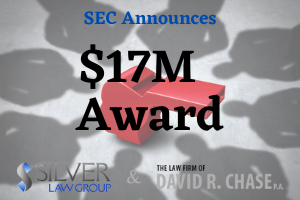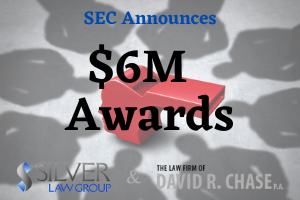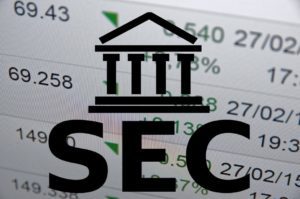 In this blog, we often discuss the financial bounties that whistleblowers receive from the US Securities & Exchange Commission (SEC) and occasionally, the Commodities Futures Trading Commission (CFTC.) What isn’t always discussed is the time and effort that it takes for a whistleblower to get to that point. Continue reading
In this blog, we often discuss the financial bounties that whistleblowers receive from the US Securities & Exchange Commission (SEC) and occasionally, the Commodities Futures Trading Commission (CFTC.) What isn’t always discussed is the time and effort that it takes for a whistleblower to get to that point. Continue reading
Articles Posted in SEC Whistleblower
Scott Silver And David Chase Selected As Top Rated Securities Litigation Attorneys By Super Lawyers 2022
 Scott Silver and David Chase were selected as top-rated securities litigation attorneys by Super Lawyers for 2022. Scott received the same award in 2021, and was previously selected for Super Lawyers’ Rising Stars list. David Chase was selected to Super Lawyers for years 2006-2007, 2009-2019, and 2021-2022. Continue reading
Scott Silver and David Chase were selected as top-rated securities litigation attorneys by Super Lawyers for 2022. Scott received the same award in 2021, and was previously selected for Super Lawyers’ Rising Stars list. David Chase was selected to Super Lawyers for years 2006-2007, 2009-2019, and 2021-2022. Continue reading
SEC Awards $17M Bounty To Whistleblower
In a recent press release , the SEC announced that it has awarded an individual a bounty of $17 million for their assistance as a whistleblower.
, the SEC announced that it has awarded an individual a bounty of $17 million for their assistance as a whistleblower.
The individual provided information that led to the SEC opening an investigation. Additionally, the individual gave continued assistance to SEC staff, speaking with them on multiple occasions. Continue reading
Two Whistleblowers Receive More Than $6M In SEC Bounties
 In a recent press release, the US Securities & Exchange Commission (SEC) announced the award of more than $6M in bounties in two separate orders. Both orders involve providing information to the SEC for two covered actions.
In a recent press release, the US Securities & Exchange Commission (SEC) announced the award of more than $6M in bounties in two separate orders. Both orders involve providing information to the SEC for two covered actions.
In the first order, the whistleblower was described as an “outside professional” who was the target of a product solicitation. Believing the product to be misrepresented, the individual contacted SEC staff to notify them of the activity. SEC staff opened an investigation, and the individual offered original information and continual assistance that led to a successful enforcement action. The Claims Review Staff (CRS) awarded this whistleblower “more than $3 million.” Continue reading
New SEC Rules For SPACs: What Are They And Why Do They Matter?
 While Special Purpose Acquisition Companies (SPACs) SPACs—shell companies created for the sole purpose of funding the future acquisition of another company—have existed since the 1990s, interest (and investing) in them took off during the pandemic. But the rise of SPAC popularity means that hedge funds and others have been entering the SPAC market, while a number of SPACs are under investigation. That has led the Securities and Exchange Commission (SEC) to propose new rules relating to SPACs. Continue reading
While Special Purpose Acquisition Companies (SPACs) SPACs—shell companies created for the sole purpose of funding the future acquisition of another company—have existed since the 1990s, interest (and investing) in them took off during the pandemic. But the rise of SPAC popularity means that hedge funds and others have been entering the SPAC market, while a number of SPACs are under investigation. That has led the Securities and Exchange Commission (SEC) to propose new rules relating to SPACs. Continue reading
SEC’s Priorities For 2022: What Are They And How Will This Impact SEC Whistleblowing?
 Leaders of the Securities and Exchange Commission (SEC) recently released its 2022 priorities for its Department of Examinations (EXAMS)—the office charged with monitoring risks and protecting investors. The SEC has made a point of saying the list is just a guideline. EXAMS will still pursue other investigations not on the list. But for those who are considering becoming a whistleblower, it can help strategize your reporting. Continue reading
Leaders of the Securities and Exchange Commission (SEC) recently released its 2022 priorities for its Department of Examinations (EXAMS)—the office charged with monitoring risks and protecting investors. The SEC has made a point of saying the list is just a guideline. EXAMS will still pursue other investigations not on the list. But for those who are considering becoming a whistleblower, it can help strategize your reporting. Continue reading
Brinks Settles With SEC Over Employee Whistleblower Prohibitions
 Most employees aren’t surprised when they’re asked to sign a non-disclosure agreement (NDA) as a condition of employment. It’s one way to warn and penalize employees about telling company secrets. But when the NDA prohibits an employee from becoming a whistleblower, the SEC steps in. Continue reading
Most employees aren’t surprised when they’re asked to sign a non-disclosure agreement (NDA) as a condition of employment. It’s one way to warn and penalize employees about telling company secrets. But when the NDA prohibits an employee from becoming a whistleblower, the SEC steps in. Continue reading
Fees From Cryptocurrency Providers— When Are Investors Paying Too Much?
 Compared to the decades of experience investors have with the S&P and NASDAQ, everyone’s a comparative rookie when it comes to cryptocurrency. And crypto’s appeal often comes from the idea that crypto exists outside of traditional banking. However, overlooked in that idea is the reality that—not unlike traditional banking and other investment platforms—many cryptocurrency services charge users expensive fees for these crypto transactions. And these fees can get very steep, very quickly. Continue reading
Compared to the decades of experience investors have with the S&P and NASDAQ, everyone’s a comparative rookie when it comes to cryptocurrency. And crypto’s appeal often comes from the idea that crypto exists outside of traditional banking. However, overlooked in that idea is the reality that—not unlike traditional banking and other investment platforms—many cryptocurrency services charge users expensive fees for these crypto transactions. And these fees can get very steep, very quickly. Continue reading
Is Your Hedge Fund Defrauding Clients? If So, What Can You Do?
 In January of this year, the Securities and Exchange Commission (SEC) published a “Risk Alert” warning potential investors about four areas of concern—ways in which investment advisers are defrauding their clients. Let’s briefly discuss each of these in turn, to see what concerning practices you should be on the lookout for. Continue reading
In January of this year, the Securities and Exchange Commission (SEC) published a “Risk Alert” warning potential investors about four areas of concern—ways in which investment advisers are defrauding their clients. Let’s briefly discuss each of these in turn, to see what concerning practices you should be on the lookout for. Continue reading
Will Your SEC Whistleblowing Lead To A Massive Case Against The Company?
 Before sitting down for her now-famous 60 Minutes interview, former Facebook employee Frances Haugen had filed eight complaints with the Securities and Exchange Commission (SEC). In these, she alleged that Facebook was misleading investors in how the company doesn’t act against hate crime, how it facilitates the spread of disinformation, how it harms young girls’ psychological wellbeing, and much more. Continue reading
Before sitting down for her now-famous 60 Minutes interview, former Facebook employee Frances Haugen had filed eight complaints with the Securities and Exchange Commission (SEC). In these, she alleged that Facebook was misleading investors in how the company doesn’t act against hate crime, how it facilitates the spread of disinformation, how it harms young girls’ psychological wellbeing, and much more. Continue reading
 SEC Whistleblower Lawyer Blog
SEC Whistleblower Lawyer Blog

